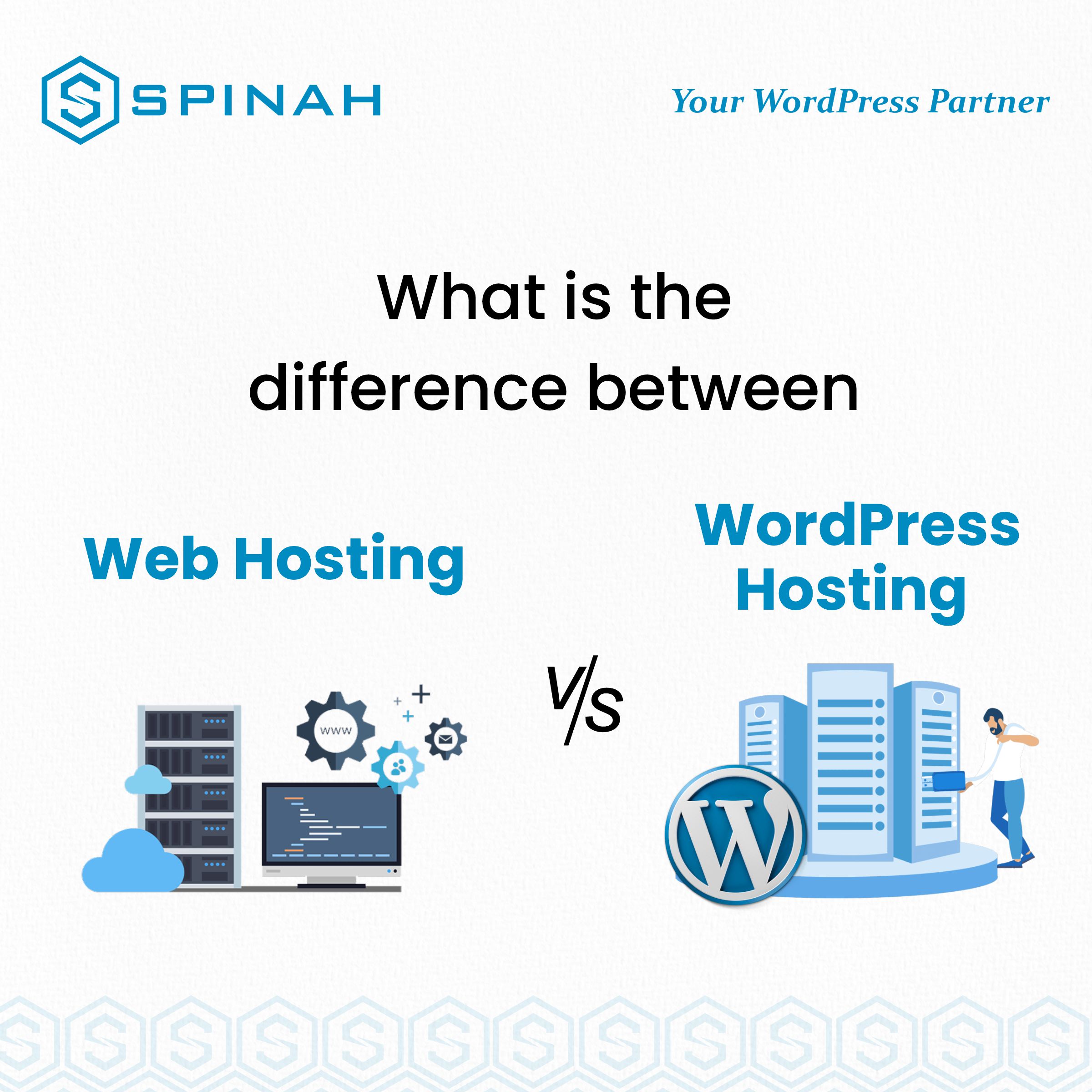It’s no longer news that Web hosting and WordPress hosting are the two main players in the chain of hosting systems. These two platforms are primarily built to host a website, so it follows that they possess some unique features but you should also be conscious of the differences that set them apart from each other.
Therefore, this article will help you have a clearer picture of the main differences between the two hosting services and help you decide which one is most suitable for your website’s needs. We will also discuss the advantages and disadvantages of both hosting services alongside some tips on how to maximize them. Let’s pump the gas!
Web Hosting
Web hosting is the process of storing and managing data on servers connected to the internet. The servers are responsible for responding to requests from clients (browsers) for web pages that have been published online. In other words, web hosting provides the physical infrastructure for websites to be accessible on the internet.
Types of Web Hosting
There are different types of web hosting but let’s streamline our focus to shared hosting, VPS hosting, and dedicated hosting.
Shared Hosting
Shared hosting is a type of web hosting service where multiple websites are hosted on a single server. It is the most basic and economical form of web hosting. After all, the cost of the server is shared among many customers.
The main benefit of shared hosting is its low cost and this makes it a go-to option for small businesses and private individuals. However, the downside here’s that the resources of the server are shared among all the websites hosted on it which can lead to slower website performance and limited control over the server.
VPS (Virtual Private Server) Hosting
VPS (Virtual Private Server) hosting is a type of web hosting that offers more control and resources than shared hosting. In VPS hosting, a single physical server is divided into multiple virtual servers, each with its own operating system and resources.
This allows for more control over the server and better performance since the resources of the server are not shared among multiple websites.
Hence, are you a medium-sized business owner or individual with preference for more control and resources over the system and resources? Your best bet here is that you opt for VPS hosting instead of shared hosting.
Dedicated Hosting
As the name suggests, dedicated hosting is a type of web hosting service where a single server is dedicated to a single customer. This means that the customer has full control over the server and its resources and is not sharing the server with any other websites.
Dedicated hosting is the most expensive form of web hosting but also the most powerful and customizable. It is ideal for large businesses and organizations with high-traffic websites and require a high level of control over their server resources.
Examples of Web Hosting
Bluehost
Bluehost is one of the most popular web hosting providers and offers a wide range of hosting options including shared hosting, VPS hosting, and dedicated hosting. They are known for their easy-to-use control panel and excellent customer service.
HostGator
HostGator is another popular web hosting provider that offers a wide range of hosting options, including shared hosting, VPS hosting, and dedicated hosting. They also offer a variety of additional services, such as domain registration and website builders.
DreamHost
DreamHost is a web hosting provider that specializes in providing hosting for WordPress websites. They offer a range of hosting options, including shared hosting, VPS hosting, and dedicated hosting, as well as a variety of managed WordPress hosting options.
A2 Hosting
A2 Hosting is a web hosting provider that offers a range of hosting options, including shared hosting, VPS hosting, and dedicated hosting. They are known for their high-performance servers and excellent customer service.
InMotion Hosting
InMotion Hosting is a web hosting provider that offers a range of hosting options including shared hosting, VPS hosting, and dedicated hosting. They are known for their reliable uptime and excellent customer service.
Advantages of Web Hosting
- Accessibility: Web hosting makes it possible for people to access your website from anywhere in the world as long as they have an internet connection.
- Scalability: Web hosting providers offer a range of plans that can accommodate websites of varying sizes and traffic levels so as your website grows, you can easily upgrade to a more powerful plan.
- Reliability: Web hosting providers have large, powerful servers that are designed to handle high levels of traffic, which means that your website will be less likely to experience downtime.
- Security: Web hosting providers typically offer built-in security features such as firewalls and backups to help protect your website from hacking and other security threats.
- Technical support: Most web hosting providers offer technical support to help you with any issues you may have with your website or hosting account.
Disadvantages of Web Hosting
- Downtime: Web hosting services can experience periods of downtime, which can lead to loss of revenue and a poor user experience.
- Limited resources: Shared web hosting plans may have limitations on the amount of resources, such as storage and bandwidth, that can be used.
- Security risks: Websites hosted on shared servers may be vulnerable to security breaches, such as hacking and malware attacks.
- Lack of control: With some web hosting plans, users may have limited control over their server environment, making it difficult to customize or optimize their website.
- Technical expertise required: Setting up and maintaining a website on a web hosting service may require technical expertise, which can be a problem for non-technical users.
- Cost: Some web hosting services can be expensive, especially for businesses with high-traffic websites.
- Limited scalability: Some web hosting plans may not be able to handle large amounts of traffic, making it difficult for businesses to scale their websites as they grow.
WordPress Hosting
Now, let’s discuss WordPress hosting. This is a specialized type of web hosting designed using the WordPress platform and is optimized for websites and blogs. It typically covers additional features such as automatic updates, easy installations for WordPress plugins and themes, and integrated security features.
There are a lot of web hosting companies that provide WordPress hosting. Here are some of the providers:
Advantages of WordPress Hosting
- Easy to use: WordPress hosting is designed to be user-friendly, making it easy for even non-technical users to create and manage a website.
- Large community: WordPress has a large and active community of users and developers. This means that there is a lot of support and resources available.
- Cost-effective: WordPress hosting can be a cost-effective solution for businesses since it is less expensive when compared to other types of hosting.
- High security: WordPress hosting providers usually have additional security measures in place to protect the website from hacking and malware attacks.
- Automatic software updates: Most of the WordPress hosting providers will take care of the software updates automatically, which ensures the website is always running on the latest version of the software.
- Optimized for WordPress: WordPress hosting is optimized specifically for the WordPress platform, which means that the performance and speed of the website is optimized for the best user experience.
Disadvantages of WordPress Hosting
- Limited resources: Some shared WordPress hosting plans may have limitations on the amount of resources, such as storage and bandwidth, that can be used.
- Security risks: Websites hosted on shared servers may be vulnerable to security breaches, such as hacking and malware attacks.
- Slow performance: Some WordPress websites may experience slow performance due to high traffic or poor hosting infrastructure.
- Complex updates: Updating the WordPress core, themes and plugins can be complex and time-consuming, especially for non-technical users.
- Additional cost: Some premium themes and plugins may require additional cost and subscription to use.
- Limited email hosting: Most WordPress hosting providers don’t provide email hosting, which means you have to subscribe to an email hosting service separately.
Difference Between Web hosting vs WordPress hosting
| Factor | WordPress Hosting | Web Hosting |
| Definition | A type of hosting that is specifically optimized for WordPress websites, with pre-configured settings and automatic updates. | A type of hosting that allows you to host any type of website, including WordPress, but does not come with pre-configured settings or automatic updates. |
| User Interface | User-friendly and optimized for WordPress, with easy-to-use dashboard and access to WordPress-specific features. | Generally, a generic control panel or cPanel that may not be optimized for WordPress, with limited access to WordPress-specific features. |
| Server Configuration | Highly optimized for WordPress, with pre-configured settings and automatic updates for WordPress core, plugins, and themes. | May not be specifically optimized for WordPress, requiring manual configuration and updates for WordPress core, plugins, and themes. |
| Performance | High performance, with faster load times and better website speed optimization due to specialized configurations. | Performance can vary depending on the hosting plan and provider, with slower load times if the server is not optimized for WordPress. |
| Security | Often includes enhanced security features, such as malware scanning, automatic backups, and firewall protection. | Security features can vary depending on the hosting plan and provider, with some offering enhanced security options for an additional fee. |
| Support | Often includes specialized support for WordPress, with 24/7 assistance from WordPress experts. | Support can vary depending on the hosting plan and provider, with some offering specialized support for WordPress for an additional fee. |
| Cost | It can be more expensive than standard web hosting plans, with monthly fees ranging from around $3 to $50 depending on the WordPress host. | Can be more affordable than WordPress hosting plans, with pricing starting from around $2 to $20 per month depending on web host |
Criteria for Choosing Web Hosting and WordPress Hosting
When deciding between web hosting and WordPress hosting, there are a few things you should think about and put in order of importance. Here they are:
Type of Website
If you are planning to create a simple brochure-style website or a small blog, a shared hosting plan from a web hosting provider may be sufficient. However, if you are planning to create a more complex website such as an e-commerce site or a large blog, you may need a more powerful hosting solution such as a VPS or a dedicated server.
Budget
The cost of web hosting and WordPress hosting can vary depending on the provider and the plan you choose. Compare the cost and features of different hosting plans from different providers to find the best option for your budget.
Level of Support and Maintenance
Some web hosting providers may not offer automatic updates or a staging environment for testing WordPress updates as part of their hosting plans, while WordPress hosting providers often include these features as a standard part of their plans.
Performance
WordPress hosting providers often optimize their servers for the performance of WordPress websites, which can lead to faster load times and better overall performance. This can be an important factor if you expect a high amount of traffic on your website.
Security
Security is an important consideration regardless of the type of hosting you choose. Look for hosting providers that offer automatic updates and backups, as well as specialized security measures such as SSL certificate and DDoS protection.
Technical Support
Consider if you are comfortable with managing your own website, or you would prefer a hosting provider that offers specialized technical support for WordPress related issues.
Scalability
As your website grows, you may need more resources and capabilities. Choosing a hosting plan that can scale up with your website will save you from having to migrate your website to a new host in the future.
By considering these criteria, you will be able to make an informed decision and choose the hosting option that best suits your needs and budget.
FAQS on Web Hosting vs WordPress Hosting: A Comparative Analysis
Web hosting is a general term used to describe the service of providing storage and access to a website on the internet. WordPress hosting is a specialized type of web hosting that is specifically optimized for hosting WordPress websites.
Yes, you can install WordPress on a web hosting plan. However, WordPress hosting plans typically come with pre-installed WordPress and other features optimized for WordPress such as automatic updates, a staging environment, and specialized technical support.
Not necessarily. The cost of web hosting and WordPress hosting can vary depending on the provider and the plan you choose. However, in general, WordPress hosting plans may be slightly more expensive than basic web hosting plans as they offer specialized features for WordPress websites.
It depends on the resources and capabilities of the web hosting plan. Basic web hosting plans may not be suitable for large and high-traffic WordPress websites as they may not have the necessary resources and performance capabilities. It’s recommended to use a more powerful hosting solution such as VPS or dedicated server for large and high-traffic websites.
No, you do not need a WordPress hosting plan if you are not using WordPress. A regular web hosting plan can be used for other types of websites.
Final Thought
Ultimately, the type of hosting you choose will depend on your budget, site needs, and experience level. Thus, you should carefully consider each option before making a decision. Here’s a tip, web hosting is a good option for those who are just starting out and don’t require any additional features or specialized support.
WordPress hosting is recommended for those who are looking to create a website using the WordPress platform and require extra features, support, and performance optimization.
If you have any questions or need help selecting the right hosting plan for your needs, it is always a good idea to consult an experienced web professional such as Spinah.












